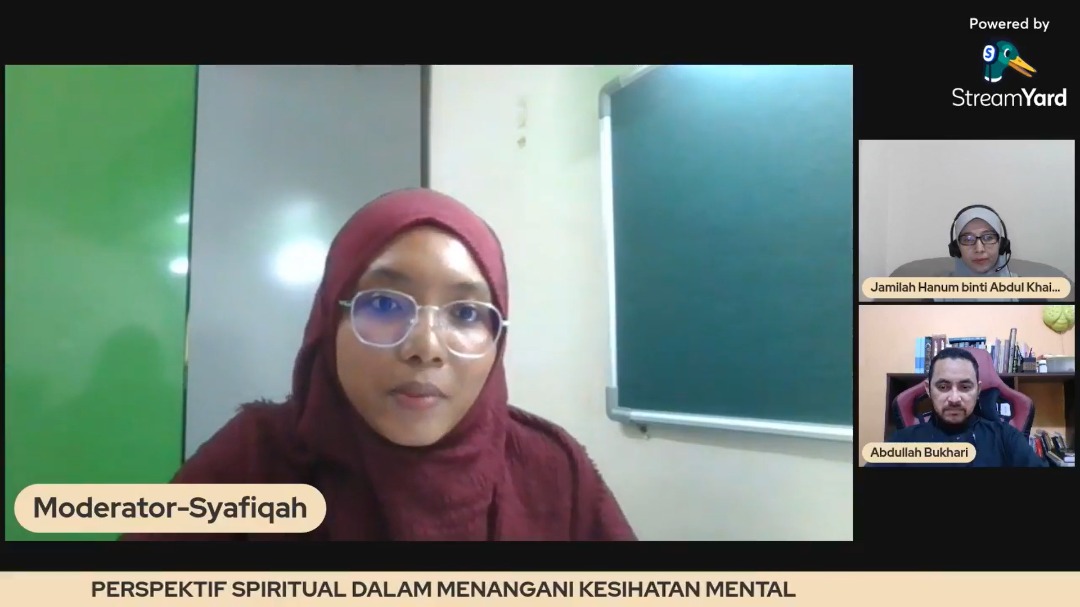By Ameerah Angelina
GOMBAK, 1 November 2021: There are various stigmas, both self-stigma and societal stigma, surrounding mental health that still exist in Malaysian society today, with many still lacking in knowledge on this issue and tend to blame it on lack of faith or weak spirituality.
With the rise of cases of COVID-19, mental health issues have skyrocketed in Malaysia with increasing cases of mental health diagnosis, suicide and self-harm.
Although there has been increasing efforts in raising awareness regarding mental health, many still have common misconception regarding mental health and spirituality, a topic that this webinar aimed to clarify.
This issue was discussed in a webinar titled, œPerspektif Spiritual dalam Menangani Kesihatan Mental (The Spiritual Perspective in Managing Mental Health), which featured Ustaz Abdullah Bukhari B Abdul Rahim, Deputy Director of CELPAD, and Dr. Jamilah Hanum Binti Abdul Khaiyum, Assistant Professor from Psychology Department, Kulliyyah of Islamic Revealed Knowledge and Human Sciences (KIRKHS).
œThere are even some ustaz who, sadly, still believe that mental health disorders are due to not practising religion enough, admitted Ustaz Abdullah as he shared his personal experiences with other religious Muslims who shared this misconception in our society.
However, he remarked that mental disturbances are not entirely due to spirituality and emphasised how humans must not focus solely on spirituality as it goes hand in hand with other aspects as well such as physical, mental and emotional.
While he agreed that some cases may be due to spirituality, there are also people who are highly religious who still suffer from mental health disorders. He gave the example of Sayyidatina Maryam (AS) who battled with depression and anxiety when she was pregnant with Prophet Isa (AS).
Ustaz Abdullah further added that we must not judge others who are struggling, especially those who have fallen victim to suicide.
œSuicide is a major sin. But Islam gives great consideration to aql or sanity, and those who are insane cannot be punished. We cannot say that someone who committed suicide will go straight to hell because not everything is black and white. We need to look at the bigger picture and consider other factors too, Ustaz Abdullah said.
œWe get no benefit from judging others, he added as he reminded the audience to always think positively and make du’a instead of making assumptions and conclusions about another persons faith.
Having had the same mindset of mental health issues being related to weak faith in the past, Ustaz Abdullah expressed his gratitude to have been given the chance to study mental health after his wife was diagnosed with anxiety disorder and realised how wrong his thinking was then.
In terms of coping mechanisms, Dr. Jamilah shared that Western coping techniques also exist in Islam but the main difference is in the niat or intention.
Among the coping strategies that psychologists may prescribe to their patients include yoga and meditation which are relaxation techniques.
œWhen our mind or mental state is unhealthy, it will affect our physical body too, said Dr. Jamilah.
This is why relaxation techniques like yoga can help the body relax and feel at ease as it helps with the blood flow.
Dr. Jamilah also shared another type of relaxation technique called œProgressive Muscle Relaxation which involves being aware of the area on the body that feels tense or uncomfortable, then applying pressure or stretching the area before releasing it slowly.Â
She also noted,œThe travelling of our thoughts to either the past or the future can cause us to feel uneasy or anxious. So, we need to slow down our thoughts and breathe through meditating, especially in our fast-paced life today.
In addition, Dr. Jamilah explained that meditating helps us slow down by focusing only on the present and our current physical state.
She also told the audience that meditation is taught in Islam as well, but the difference is that Islamic meditation encourages us to be humble and surrender ourselves to Allah SWT as we are weak and powerless creatures created by Him.
Asked about how to advise people who glorify Western coping mechanisms and discoveries regarding mental health over the Islamic teachings, Ustaz Abdullah said that there is no need to fight against the Western techniques as long as it is not against the Islamic Syariah and teachings.
œEven if it originates from the West, if it is not against Islam, then our Muslim brothers and sisters have the right to benefit from it because everything good comes from Allah SWT, he tells the audience.
He added, œWe, as Muslims, should feel a bit ashamed that more Westerners are discovering and researching the good that Allah SWT has blessed us with instead of Muslims themselves.
Although the webinar has clarified that lack of spirituality cannot be assumed to be the reason for mental health disorders, both Dr. Jamilah and Ustaz Abdullah shared similar views and agreed that an Islamic approach in therapy for those struggling with mental health issues is effective.
Dr. Jamilah has conducted several research and studies in which she found that Acceptance and Commitment Therapy, paired with elements of Islamic spirituality, are effective in reducing psychological distress.
Jointly hosted by Mahallah Sumayyah IIUM, Centre for Languages and Pre-University Academic Development (CELPAD) and Psychology Department, KIRKHS, and live-streamed on Mahallah Summayyah IIUMs Facebook page on 24 October, the webinar was informative for students to gain deeper insights on mental health from spiritual perspective.
The recording of the webinar can be accessed here.***
